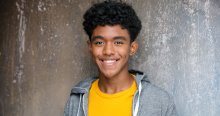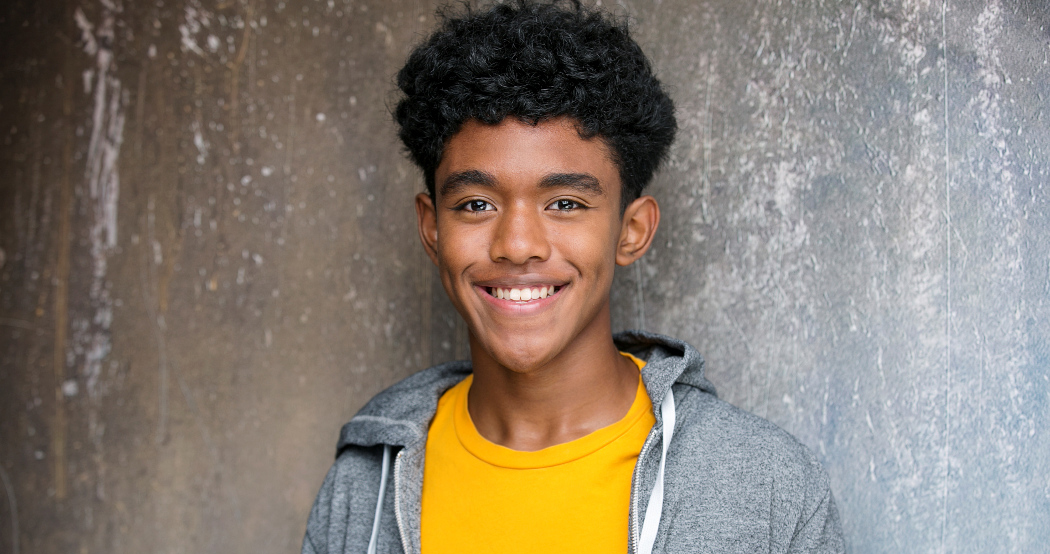371 Bloor Street West
Toronto, ON M5S 2R7 get directions
Toronto, ON M5S 2R7 get directions


Knowing how to debate effectively provides you a type of “student armor where you can defend your own ideas, and also confront the ideas of others,” says Jonathan Roswell, a Grade 11 student at Bishop Reding Catholic Secondary School in Milton, Ont., who honed his power of speech at UTS Debate and Public Speaking Camp this summer.
“This camp is so relevant and crucial today, especially considering the climate that we now find ourselves in is one where conversations with friends are constantly revolving around politics, where people are constantly being scrutinized for their ideas. To be able to debate properly and understand how to address the ideas of others is so essential.
Jonathan was one of 120 Black youth from across Ontario who had the opportunity to attend virtual University of Toronto Schools camps this summer through what UTS Principal Rosemary Evans calls “a powerful new partnership” with the SummerUp initiative. Launched this year with funding from the Ontario Ministry of Education, SummerUp was created by renowned education and community leader Trevor Massey through his organization, the Lifelong Leadership Institute and its Leadership by Design program.
“SummerUp was a monumental event that will undoubtedly have ripple effects for years to come,” says UTS Debate and Public Speaking Camp Director Sagalina Coco Doré (pictured right), who is also the UTS Head Coach of Debate and Public Speaking, and the Admissions and Outreach Facilitator. She says this debate camp, with a social justice focus, was the first of its kind exclusively for this historically underserved and marginalized community.
More than programs for Black youth, SummerUp is an invitation that aims to, “offset pandemic-induced isolation and academic disruption that defined the 2020-21 school year,” as described on the website. An array of academic, arts and aspirational summer programming, which included UTS camps and also programs through other organizations, was offered to Black youth to hone their leadership skills and self-confidence.
Along with Debate and Public Speaking, two other UTS camps welcomed SummerUp youth: Bright Lights in the Lab, with a focus on neuroscience and understanding the brain, and Global Health Mini-Masters, where the youth were tasked with reimagining equitable global health care.
“The Global Health Mini-Masters Camp is super important with everything that's going on in the world,” says UTS graduate Anjali Kathir ’21 (pictured below), who was a facilitator working in small groups with the youth. “We definitely need different voices and different perspectives to talk about such complex things like global health.”
Firsthand research and guest lecturers, facilitated by a partnership with University of Toronto’s Post-Graduate Medical Education and the Global Health Education Initiative, made the learning real. The camp also partners with U of T’s Ontario Institute for Studies in Education to take on a couple of teachers-in-training each year.
“Our students may not see a lot of leaders who look like themselves, or see themselves as change agents,” says Camp Director Charline Wan (pictured right). “But some of our faculty speakers might look similar to themselves, and likely are people they would not otherwise get to know in their day-to-day lives. This combination of these incredible faculty speakers, our camp and the Black youth is really about what we can do to effect positive change.”
Dr. Nahiba Islam, a General Internal Medicine Doctor at Scarborough Hospital who volunteered at the Rohingya refugee camps in Bangladesh, told the youth stories from her work, such as the day flash flooding meant the one ambulance serving the refugee healthcare clinic became stuck in the mud. “One small obstacle led to the whole health clinic, not being able to run and hundreds of refugees not be being able to see a doctor,” says Charline, who adds that Dr. Islam also discussed how structural changes as simple as the placement of the latrines helped improved the health of everyone in the camp.
The youth learned firsthand about public health policy in South Africa from Jerome Amir Singh, Head of Ethics and Law at the Centre for the AIDS Programme of Research in South Africa, as well as an Adjunct Professor at U of T’s Dalla Lana School of Public Health. His lecture sparked discussion on vaccine distribution, vaccine diplomacy and the World Health Organization’s COVAX Initiative. “That became a very, very big conversation beyond the scope of policy tying together global health and politics and students left with a very changed perspective on access to COVID-19 vaccines and the privilege that we have being in North America,” says Charline.
The Black youth researched health care solutions for underserved populations such as women, Indigenous communities, refugees, persons with disabilities and others, in the context of this global pandemic, and presented their findings in a summit at the end of the week.
“It’s our responsibility to know about different communities, and how they're affected, and not just know it on a surface level, social-media-post kind of way, but actually delving into research ourselves and looking at primary sources so we know what we are learning is in fact, a fact,” says participant Allison Levy (pictured left), who graduated from Pierre Elliott Trudeau High School in Markham this June and is now attending the University of Ottawa.
As well as camps for SummerUp students, UTS ran an array of regular camps, adapted to the virtual format.
“You really see the beauty of what's happening is through the questions the campers ask,” says UTS Summer Programs Coordinator Sharon Zillmer. “Doing the camp online has been a real evolution for all of us because of newchallenges like what do you do when nobody will turn their camera on? But there's also the magic.”
UTS Geography teacher Mike Farley took students around the world virtually with his Animals and Art Camp, (picture right by camper Emilia) from the Toucan Rescue Ranch in Costa Rica to the Turtle Hospital in Costa Rica and more. UTS Visual Arts teacher Nasreen Khan taught students about the intricacies of aesthetics in Photography: Capturing Light.
Richard Cook, a UTS Canadian and World Studies teacher who also coordinates the Global Citizenship program, taught students how to change the world, as Director of the Integrative Thinking program, by thinking like social entrepreneurs and applying the process to real-world challenges.
Debate camp also ran as part of the regular UTS camp program, as well as Bright Lights in the Lab with Camp Director Isabella Liu, who wears many hats at UTS as a Chemistry and AP Research teacher and the EdTech Integration Program Coordinator. Bright Lights also continued its longstanding community partnership with the Firefly Foundation. Aiming to develop aspiring young neuroscientists, the Foundation provided scholarships for campers and collaborated on the program, a partnership further heightened because Sharon Zillmer is also the Firefly Program Manager.
On the emotional final day of Speech and Debate Camp, Assistant Coach Kieran Kreidie-Akazaki ’17 said to the Black youth from SummerUp: "I can honestly say that I've never worked with a group of students who found their feet as debaters so quickly, and who developed at such a rate.”
Jonathan, who also attended two other programs through SummerUp, recalls how program creator Trevor Massey told students that what they do in the summer helps shape who they are during the school year, and Jonathan has taken those words to heart. “That's something that was so important to me – to exercise my mind and grow and cultivate a passion for these different subjects, and really just develop a hunger and this thirst to learn more and more. That's definitely something that SummerUp and the Debate Camp at UTS taught me how to do.”
